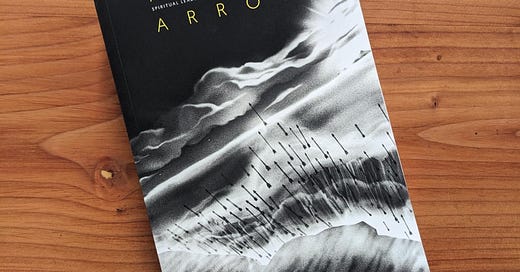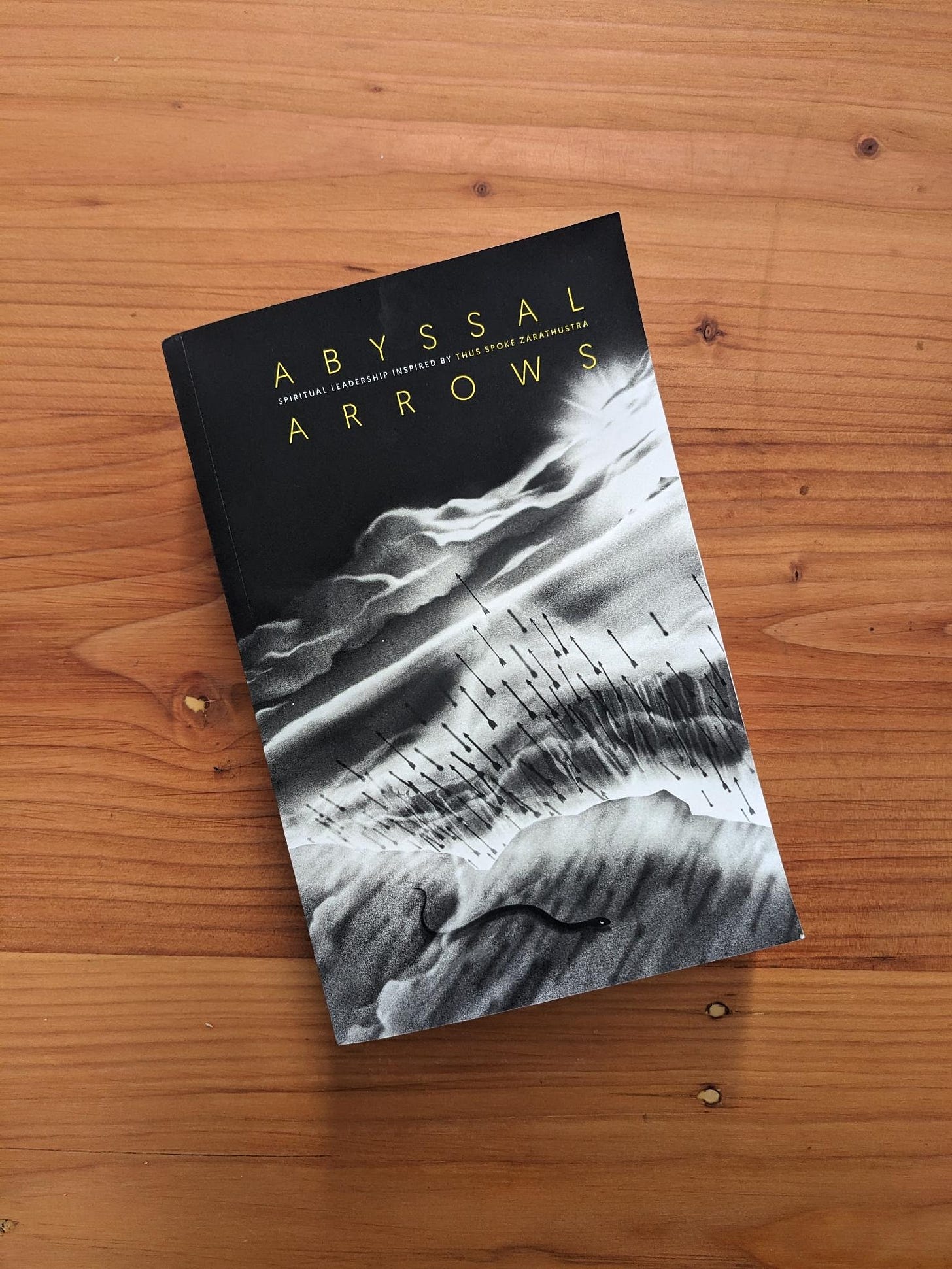Paradox & Spiritual Leadership (PART FIVE)
A moment comes when the leader realises that not enough and not yet is now a self-inflated memory, a recursion obscuring the vital immanence of being together now, and making with.
Dear reader,
This is the final part to a work I authored for Abyssal Arrows: Spiritual Leadership Inspired by Thus Spoke Zarathustra, edited by Cadell Last and O.G. Rose, recently published by Philosophy Portal Books. You can find a link to the paper copy of the text here. Many excellent writers contributed to this work including Last, Rose, Alex Ebert, Layman Pascal, Samuel Barnes, Andrew Sweeny, Daniel Fraga, Carl Hayden Smith and several others.
Here you can read Part 1, Part 2, Part 3 and Part 4.
—
V
Spirituality relates to the integration of a world into oneself. Religion relates to the integration of oneself into a world.
Forrest Landry1
To close I will relate with the notion of spirit and leadership one more time. In particular I draw to mind two characteristics of spiritual process intimated in this work as a whole. The first is aloneness, elsewise referenced as solitude, or privacy. The second is continuity, which has been intimated through the frame of relating with a kind of ‘greater than’, or at least an ‘other than’, and certainly an inexhaustible beyond.
Aloneness has been seen as an essential quality of spiritual process: a condition of the activity. Necessary in so far as a self is singular: singular in so far as prisms of perception cohere as a distinct nexus, conditioning the possibility for a distinctive ‘one’ to orient in process with the wave of that encounter. Put a little differently, there is this sense that spirituality involves breathing the world through: a real metabolization as encounter and orientation with that which conditions perception, as well as that which is perceived. This sense remains true to the etymology of spirit as ‘spirare’ (to breathe), while implying a turn toward an outward movement—influence as necessary expression into the world—and thereby a relation with the greater-than before and beyond.
In Thus Spake Zarathustra, we see the character of Zarathustra iteratively undergo periods of solitude, transformative meditation and contemplation, and return to relation with other beings in the world. Even at the very close, in leaving his cave full of so-called higher men to set off alone once more, the movement away is framed by relation to his children to come. Aloneness, embedded in deeper relation to other as a kind of greater-than.
It is here in the mode of relating with this other where I find myself to be in difference with the Nietzsche I read, and most particularly with respect to the notion of spiritual leadership. Thus Spake Zarathustra is a truly profound text. Yet there’s a sense in which the hammer Nietzsche so famously employs in his philosophy (which as a metaphor sometimes does the elegant subtlety of his prose disservice), does seem too often to treat the human being encountered as a nail. There is purpose in the hammering, to be sure. And it’s worth contending the observation that Nietzsche is also engaged to hammer at the ‘table of values’ which ‘hang over’ the post-Platonist, Christic Western culture as he sees it.2 But there is little by way of transformative dialogue in Thus Spake Zarathustra, and too often we are told that, rather than shown how Zarathustra comes to be beloved by some.
It is not that I’m suggesting Zarathustra’s spiritual leadership ought be seen on some aspirational scale of ‘beloved: worthy or not?’ But I do not see a developed manner by which Nietzsche through Zarathustra meets others as they are, in relation to that which they could be, such that the coming to awareness of the ‘greater than’ between them might be realised in a continuity of participation with the real of our shared lifeworld. For all the talk of dance in Nietzsche, where is the invitation, truly? For dance at least must involve a dance of invitation. It is mostly, as far as I read, all talk of something we might call a summons: command and obey,3 which it goes without saying can be considered in one presentation a kind of tyranny, and another something far more appropriate, where loving hierarchy enacts response to day’s call.
There is wisdom where Nietzsche says: ‘He who cannot obey himself will be commanded.’4 And it is fine and worthwhile to make the many remarkable, epochal insights Zarathustra makes about the many lacks associated with the present state of humanity, the higher men, and their various disconnections from relation to the ‘meaning of the earth’. I will certainly attest to the significance of encountering Nietzsche earlier in my life and still. But there is also a transformative intelligibility to the meaning of the earth which in my experience can be realised in a different mode of relating: one that’s more dialogic, more encouraging of deeper mutual participation. A mode where orienting as crest of immanent voice, dying into a sentence, is supported by a field of profound integrity. A field where spiritual leadership is encouraged forth from the spirit of those gathered, and therefore a context inspired which can more readily support profound self-overcoming and real relating with ecology and religion. It is not that the role of deep individual process is in any sense to be minimised, nor that there isn’t value or import to hierarchies in their appropriate time. Nor am I advocating for some slick new meta-wisdom practice. It is instead this:
Spiritual leadership is, in a simple sense, about how we treat others. The process is distinguished in those who are, and have become, so that they are able to do that with quality. And there’s a lot to that that. Of course there is, if one cares to zoom in. But beyond the inspiring myth as imaginal influence for a being or time which is yet to come, through which Nietzsche has clearly had so much influence: it is a lesser leader of spirit, as I see it in the here and now, who too readily forecloses the transformative potential of another’s contribution on the way to greater than. A closer realisation of what it means to participate in transformation itself, in context with others (which in one way or another is always present), involves more than engineering a channel to evidence ways someone else just ain’t there yet. And I’m not saying there aren’t ‘theres’ of distinct awareness or capacity to inhabit. It is just that the leaders we need today must address the context we actually live in, the beating heart of real relation, rather than indefinitely postpone it, in wait for the promised children to come (especially as judged by the eye of one progenitor!)
Yet Thus Spake Zarathustra is a many voiced text (even if they are the many voices given to us by the one Nietzsche), and it is transformative in its way. So perhaps it would be unfair not to recognise one of the key metaphors Nietzsche offers us through which to see humanity as he does:
Man is something that should be overcome. [...] Man is a rope, fastened between animal and Superman—a rope over an abyss. [...] What is great in man is that he is a bridge and not a goal.
Nietzsche5
This core metaphor of ‘bridge’ does seem to speak precisely to a mode of transformation on the way to greater-than. But what of the bridge-making? To graduate from that isolated process, strung out alone, forever misunderstood, to seeing together, sharing silence and voice together. A moment comes when the leader realises that not enough and not yet is now a self-inflated memory, a recursion obscuring the vital immanence of being together now, and making with. In other words: what of leadership as regards our modes of participation as bridge-makers in the here and now? Dying into the whole-making. Further paradox and challenge abound, no doubt, and we’ve touched on several above. But as I see it, the spiritual leader must dignify the always already, dignify the presence of the vital spirit—even if subtle, deep, ready and unready—which courses through bodies, luminous as lightning behind the eyes, inseparable with the lifeworld itself. This is the real encounter with greater-than: a navigation of the course as dance of discernment on the Way: a participation in the ongoing realisation of continuity through transformation. For the mystery remains, and the call of our modes of orientation remain, even as inevitable structures rise and dissolve in their time.
May we build them with integrity.
The hands of the many must join as one
And together we'll cross the riverPuscifer6
The many become one, and are increased by one.
Alfred North Whitehead7
END PART FIVE
With gratitude for your time and attention in reading this work, and to Cadell Last for his invitation to contribute on this topic.
Discernment on the Way,
Tim Adalin
(Landry 2012, 137)
I believe we can interpret Nietzsche’s challenge to the value system of his modern West in terms of an effort toward the revitalisation of the will to power infused ‘table of values’ as religious structure. (Nietzsche 2003, 84)
“All living creatures are obeying creatures. [...] He who cannot obey himself will be commanded.” (Nietzsche 2003, 137) *I am not referencing this footnoted quote to invite its acceptance as a whole true.
(Nietzsche 2003, 137)
(Nietzsche 2003, 43-44)
Thank you to Cameron Duffy for his philosophical companionship and for sharing his appreciation of this song. (Puscifer 2010)
(Whitehead 1978, 21-22)
FULL REFERENCE LIST FOR ALL PARTS
Blake, William. 1977. The Complete Poems. Edited by Alicia Ostriker. N.p.: Penguin Publishing Group.
Ebert, Alex. 2022. “The Sublation of Mathematics.” In Enter The Alien: Thinking As 21st Century Hegel, edited by Cadell Last and Daniel Garner, 211-249. N.p.: Philosophy Portal Books.
Henriques, Gregg. 2022. A New Synthesis for Solving the Problem of Psychology: Addressing the Enlightenment Gap. N.p.: Springer International Publishing.
James, William. 1961. The Varieties of Religious Experience: A Study in Human Nature. Edited by William James. N.p.: Collier Books.
Jung, Carl G. 2009. The Red Book: Liber Novus. Edited by Sonu Shamdasani. Translated by John Peck, Sonu Shamdasani, and Mark Kyburz. N.p.: WW Norton.
Jung, C. G. 2014. Collected Works of C.G. Jung, Volume 12: Psychology and Alchemy. Edited by R. F. Hull and Gerhard Adler. Translated by R. F. Hull and Gerhard Adler. N.p.: Princeton University Press.
Landry, Forrest. 2009. An Immanent Metaphysics. N.p.: Forrest Landry.
Landry, Forrest. 2012. The Effective Choice. N.p.: Forrest Landry.
Last, Cadell. 2023. Systems & Subjects: Thinking The Foundations of Science and Philosophy. N.p.: Philosophy Portal Books.
Nietzsche, Friedrich. 2003. Thus Spoke Zarathustra. London: Penguin Books.
Public Question & Answer 1. 23 July 1980. Featuring Jiddu Krishnamurti. Saanen, Switzerland: n.p.
Puscifer. 2010. “The Humbling River,” A song by puscifer from the album "Sound into Blood into Wine".
Whitehead, Alfred N. 1978. Process and reality : an essay in cosmology. Edited by David R. Griffin and Donald W. Sherburne. N.p.: Free Press.




